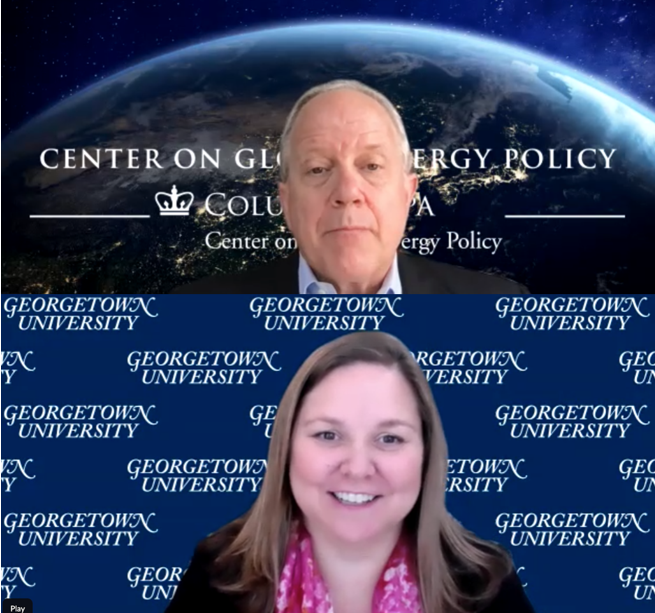
Event Recap: “An Evolving World Order: The Geopolitics of Climate Change”
On April 20, the American Security Project (ASP) held an event – “An Evolving World Order: The Geopolitics of Climate Change.” Panelists included two climate and energy academic experts: Dr. Joanna Lewis from Georgetown University and Jonathan Elkind from Columbia University. ASP President Brigadier General Stephen A. Cheney, USMC (Ret.) moderated the event.
ASP hosted the panel days after the United States and China released a joint statement pledging to cooperate to address the climate crisis. The event took place ahead of the Leaders Summit on Climate President Biden will host on April 22 and 23 with 40 world leaders, including Russian President Vladimir Putin.
BGen Cheney began the event by explaining that climate policy plays a key role in global strategic competition and will continue to serve as an instrument of soft power and leadership on the world stage. He presented ASP’s position that the United States should find ways to collaborate on climate with countries like China and Russia. The United States should also utilize its technological prowess as an instrument of power to strategically compete against China’s expanding realm of influence, bolster alliances, and restore U.S. leadership in the world.
Dr. Lewis focused her remarks on China’s posture in international climate negotiations and climate geopolitics more broadly. She began by explaining that China’s domestic energy and emissions context plays a prominent role in its interactions with other nations. China still gets about 60% of its energy from coal, and fossil fuels have driven its economic development.
“While many are quick to call China a climate leader, China has historically been a very reluctant leader in global environmental forums,” she said. “[This is] in part due to the technical and political challenges that it faces curbing carbon emissions and reducing its reliance on fossil fuels.”
The past decade saw China prioritize low-carbon energy solutions in its domestic policy, which have in turn led to significant changes in how it interacts with the world on climate. For example, the climate and energy commitments in China’s 14th five-year plan released in March 2021 aim to get China on track to meet its 2030 pledge from the Paris Agreement.
However, Dr. Lewis noted that it is easier to pledge ambitious long-term goals than short-term goals, especially as China is recovering from the COVID-19-induced economic downturn. Many climate targets from the country’s 13th five-year plan were not met, and China is facing a need for rapid economic growth that may be out of line with climate priorities. In this context, global engagement with China will be critical to pursue ambitious climate goals.
Elkind discussed the tensions between the considerable capability of the Russian scientific community and the climate skepticism rampant among many Russian policymakers. Russia’s climate targets are not ambitious, aiming for just a 25-30% reduction below 1990 emissions levels – which fell considerably following the collapse of the Soviet Union. However, Russia will also face significant consequences as a result of climate change.
“[There is increasingly] a very strong understanding that Russia will experience negative impacts from climate,” he said. These include increased invasive species spread, flooding, drought, and wildfires, as well as threats to Russia’s buildings, roads, railways, pipelines, and long-distance electric power lines.
Elkind predicted Putin’s speech for the U.S. Leaders Summit will focus on Russia’s production of world-class natural gas that does not leak methane – an idea that has largely been disproven – and also noted that Russia’s natural gas industry may face challenges due to increased regulations by the European Union and others.
The panelists then answered questions on topics ranging from the benefits of U.S. cooperation with China to strategies to leverage increased commitment on climate. Elkind observed that climate policy must be based on mutual efforts rather than coercion, since it is difficult to force countries to take action on climate if they do not already want to do so.
Dr. Lewis underlined that it is in the United States’ interests to carve out a lane to work with China on climate change, since China is the “largest living laboratory for low-carbon technologies” and offers knowledge that the United States can leverage. She also noted China’s success in positioning itself as the champion of the developing world in international climate negotiations, as well as its financing of clean energy projects abroad.
Both panelists concluded by highlighting the opportunity for constructive movement on climate following the U.S. Leaders Summit on Climate.
Watch the Full Recording Here:
Additional Resources from ASP:
Fact Sheet – China’s Fossil-Fueled Growth
Fact Sheet – Will China’s Future be Cleaner?
The Race Between the U.S. and China to Sell Electric Vehicles
Why the U.S. and Russia Should Make Arctic Cooperation a Priority





